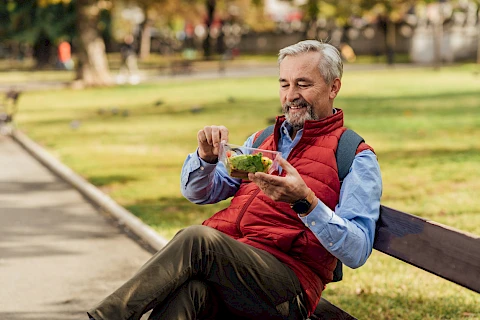
As the leaves change color and the temperatures drop during the fall season, it’s the perfect time to focus on eating healthily. Maintaining a balanced diet is part of seniors' overall health and well-being. Fall brings a bounty of seasonal produce that's both delicious and nutritious. It's time to explore the benefits of fall's seasonal fruits and vegetables, share comforting recipes, provide tips for portion control and balanced eating, and discuss how nutritional needs change with age.
Benefits of Seasonal Produce
Eating seasonally offers many benefits for seniors. Seasonal produce is at its peak in flavor, nutrition, and freshness. Here are some advantages of incorporating fall fruits and vegetables into your diet:
Seasonal produce is often richer in essential vitamins and minerals. For example, pumpkins are packed with Vitamin A, which supports vision and immune function. Apples provide fiber and Vitamin C, while squash is a great source of antioxidants and vitamins.
Comforting and Nutritious Fall Recipes
Fall is the ideal time for warming, comforting dishes that are also healthy. Soups and stews are perfect for cooler weather. They can be packed with vegetables, lean proteins, and whole grains. Make a pumpkin soup with ginger and garlic or a vegetable stew with squash, carrots, and beans.
Use whole grain flour and natural sweeteners, and add fruits or nuts to create healthier versions of baked goods. Consider making apple muffins with whole wheat flour and a touch of honey.
Portion Control and Balanced Diet
Eating healthily is not just about what you eat, but also how much you eat. Our metabolism slows as we age, and we generally need fewer calories. However, the need for nutrients does not decrease. Eating smaller portions ensures you get the necessary nutrients without consuming too many calories.
Here are some tips for maintaining a balanced diet:
- Fill half your plate with vegetables and fruits.
- Choose whole grains over refined grains.
- Include lean protein sources like fish, chicken, or legumes.
- Don't forget healthy fats like those from avocados or olive oil.
Holiday meals can be a challenge. To avoid overeating, try having a small, healthy snack before attending a gathering. Focus on filling your plate with vegetables and lean proteins first.
Changing Nutritional Needs With Age
As we grow older, our bodies require different nutrients. Learning these changes can help plan a better diet. Seniors are at risk for deficiencies in Vitamin D, B12, calcium, and iron. Include foods rich in these nutrients or consider supplements after consulting a healthcare provider.
Staying hydrated is crucial since the sense of thirst can diminish with age. Aim to drink plenty of water throughout the day. Fiber is also essential for digestive health and can be found in whole grains, fruits, vegetables, and legumes.
Senior Helpers Southern Arizona Can Help With Meal Planning and Prep
Eating healthily during the fall season doesn't have to be complicated. Focus on seasonal produce, prepare comforting and nutritious meals, and pay attention to portion sizes and nutritional needs for seniors to enjoy a balanced diet. Don't hesitate to experiment with new recipes and savor the fall flavors. If you need personalized support or more tips, contact Senior Helpers Southern Arizona serving Benson, Bisbee, Douglas, Sierra Vista, and Huachuca City. Enjoy the season and happy eating!